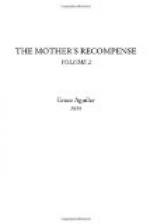“Herbert, my true English bred and English feeling cousin, marry a French woman, by my good sword, you shall not,” said Edward, laughing, when the universal surprise and joy which this information had excited had somewhat subsided. The eager question who was Herbert’s choice, was asked by Caroline and Emmeline together.
“Fear nothing, Master Lieutenant,” St. Eval said, ere Herbert could reply; “my wits, though a landsman, are not quite so blunt as yours, and I guess better than you do. Is it possible no one here can tell? has my demure brother Herbert’s secret never been suspected? Caroline, what has become of your penetration; and Emmeline, your romance? Ellen, cannot you guess?”
“Yes,” she replied, instantly, though as she spoke a sudden crimson rose to her cheek, which, though unnoticed, had been, while Mr. Hamilton spoke, pale as death.
“May you, may you be happy, dearest Herbert,” she added, calmly, as she extended her hand to him; “few are so fitted to make you so, few can so truly sympathise in your feelings as Mary Greville.”
“You are right, you are right, Ellen,” said Lady Emily Lyle, as Herbert warmly pressed his cousin’s hand, and thanked her in that low thrilling voice so peculiarly his own; and then, with a countenance radiant with animated joy, turned towards the little group, and thanking them for the joy with which his Mary’s name was universally greeted, turned to Edward and asked, with a smile, if Mary were not sufficiently English to content him.
“Quite, quite; I would even go over to France for the sake of bringing her to England in my gallant Gem,” replied the young sailor. “She is the best wife you could have chosen, Herbert, for you were ever alongside, even in your boyish days; and it would have been a sin and shame for you to have married any one else. Percy, why do not you follow such an excellent example?”
“I—because a bachelor’s life has not yet lost its charms for me, Edward! I like my own ease, my own pleasure best, and wish to be free a short time longer,” replied the young man, stretching himself on a sofa, with a comic air of nonchalance and affectation; then starting up, he added, theatrically, “I am going to be a senator, a senator; and how in the world can I think of matrimony but as a state of felicity unsuited to such a hard-working fellow as I am, or rather mean to be.”
“I commend you for the correction in your speech, Percy,” said his mother, smiling. “Mean to be and am, are two very different things.”
“But in me may chance so to amalgamate as to become the same. Mother, who would believe you could be so severe? But I forgive you; one of these days you will regret your injustice: that smile says I wish I may. Well, we shall see. And now, lords and ladies, to bed, to bed. I have swallowed such large draughts of surprise to-night, I can bear no more. A kind good night to all. Myrvin,” he called out from the hall, “if you are as early to-morrow as you were at Oxford, we will be off to Trevilion and inspect your new vicarage before breakfast, and back by night.”




